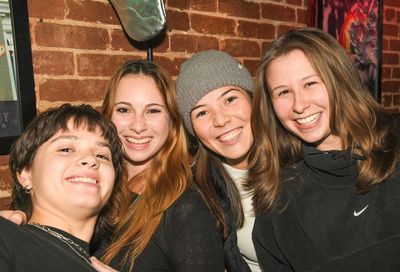Hotline Call Frequency Slow But Regular
HIPS, GLOV crisis hotline for victims of LGBT-related violence hopes to build reputation as go-to resource for the community
Last Friday, Aug. 1, marked the three-month anniversary for the LGBTQ Violence Response Hotline. Although there is still much more needed to publicize the 24-hour hotline’s existence, organizers associated with the groups manning this new community resource are optimistic and report seeing a regular volume of calls.
The hotline, funded entirely through a $60,000 grant from the D.C. Office of Victim Services (OVS), is the result of a coalition between the LGBT-friendly service provider Helping Individual People Survive (HIPS) and Gays and Lesbians Opposing Violence (GLOV) — an anti-hate crime group that is a program of The DC Center, the District’s major LGBT community center.

Photo by Todd Franson
“What we wanted to do was create a safe place for the LGBT community to go where there were LGBT competent resources should they experience an act of violence,” says Paul Tupper, chair of GLOV. “We wanted to create a hotline where they can go anonymously and where we can provide referral services to them.”
Although this is not the first time that the District’s LGBT community has had a phone resource at its disposal, it has been a while since there has been a hotline focused on providing service referrals to the larger LGBT community, as opposed to smaller subgroups. One hotline, known as the D.C. Switchboard, operated nightly for three hours at a time and was largely an informational resource. Another hotline, run through Whitman-Walker Clinic, specifically dealt with providing information about HIV.
HIPS, an organization that deals extensively with sex workers in the District, has been running its own 24-hour hotline since 1993, which had been funded through an OVS grant until funding dried up in 2010, forcing the organization to rely on private donations to keep it up and running. But that resource has not been as widely publicized to members of the LGBT community who are not involved in either pro-transgender or pro-sex worker activism, two causes around which HIPS has developed its public profile.
Cyndee Clay, the executive director of HIPS, says the current 24-hour hotline geared toward victims of violence came about after The DC Center applied for a grant through OVS.
“The DC Center actually approached us, and let everyone know they were potentially going to apply for a grant,” Clay says. “And so we approached them and said, ‘Hey, we’ve run a hotline, we’ve run a crisis line, we’ve run crisis intervention. We’ve got the institutional knowledge to handle this. You guys can handle the rollout. We can train our volunteers to deal with not just sex worker and drug user issues, but crises and people who have been victims of violence.'”
From those initial conversations sprang the new partnership between the DC Center and HIPS. The hotline, which is manned by HIPS staff or trained volunteers, is intended to provide a confidential, affirming resource for LGBTQ people suffering from bias-motivated attacks, domestic or intimate partner violence, or anti-immigrant violence. It also refers them to the appropriate direct service agencies that are tasked to deal with the effects of the trauma they have experienced, which can range from one-on-one counseling to finding shelter for the victim.
“I think we recognize that not everyone is going to want the same kind of referral, and not every referral is appropriate for everyone,” Clay says. “I think that especially holds true for LGBT victims of violence. So our counselors are trained to listen, do a lot of active listening to figure out both what people are facing and what their options are.”
Catherine Paquette, manager of outreach and mobile services for HIPS, says about ten people, the bulk of whom are volunteers, help to staff the hotline at various times throughout the week. During the course of an average shift, a volunteer may field three to four calls from HIPS clients and two to three from other individuals. All volunteers must go through 30 to 40 hours of training, where they are taught about counseling skills, harm reduction techniques, victims’ rights, and various referral services. Due to the hotline being relatively low volume, only one volunteer at a time is fielding calls. Paquette adds that volunteers have to go through an interview process to ensure they possess specific skill sets that make them suited to assist callers seeking help or referrals.

“It’s been a bit of a slow takeoff,” she says of the hotline’s capacity, while also noting that greater outreach and efforts are needed to advertise and communicate its existence to the larger community. “Calls are coming in slowly, but regularly.”
While the hotline has a longer way to go before call volume requires an expansion, complete with more phones and volunteers, Clay and Paquette say they would like to eventually broaden the hotline’s mission by providing follow-up or wrap-around services to those who call, to ensure they are utilizing the resources available to them.
Tupper, who as chair of GLOV has been managing the outreach efforts surrounding the hotline, says members of GLOV’s Hotline Working Group have handed out fliers at various events during Pride season to try and attain more press for the hotline. He adds that his group is renewing efforts to increase the hotline’s visibility, in anticipation of a yearly spike in anti-LGBT, and, specifically, anti-transgender violence, that typically occurs in late summer.
“We’re devising a plan to reach neighborhoods and target communities that did not participate in Pride,” he says. “We’re looking at outreach to churches, universities, and possibly even canvassing door-to-door and handing out literature in certain areas.”
The LGBTQ Violence Response Hotline can be accessed at any time by calling 202-888-7222. For more information, visit glovdc.org or hips.org.
[Editor’s note: This story was updated to clarify that, despite a loss of OVS funding, the regular HIPS hotline continues to be available to the public and staffed by volunteers on a 24-hour basis, funded largely by private donations.]
Support Metro Weekly’s Journalism
These are challenging times for news organizations. And yet it’s crucial we stay active and provide vital resources and information to both our local readers and the world. So won’t you please take a moment and consider supporting Metro Weekly with a membership? For as little as $5 a month, you can help ensure Metro Weekly magazine and MetroWeekly.com remain free, viable resources as we provide the best, most diverse, culturally-resonant LGBTQ coverage in both the D.C. region and around the world. Memberships come with exclusive perks and discounts, your own personal digital delivery of each week’s magazine (and an archive), access to our Member's Lounge when it launches this fall, and exclusive members-only items like Metro Weekly Membership Mugs and Tote Bags! Check out all our membership levels here and please join us today!

























You must be logged in to post a comment.